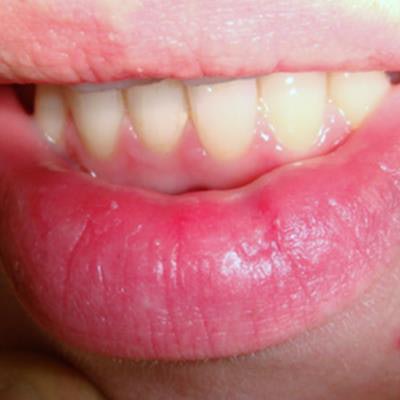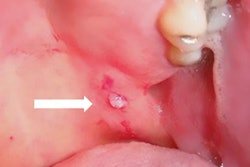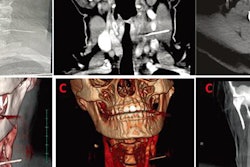
Diode laser surgery can successfully treat white lesions on the lips, promoting quick healing and complete lip restoration without causing bleeding or requiring stitches, according to a recent case report published in the Cureus Journal of Medical Science.
A diode laser can safely and effectively be used to treat recurrent white lip lesions without any scarring or unappealing aesthetics, according to the authors.
"For white lesions occurring in the lip, diode laser surgery allows for meticulous treatment and helps prevent cosmetic complications while providing effective and safe recovery," wrote the group, led by Domenico De Falco from the faculty of dentistry at the University of Bari Aldo Moro in Bari, Italy (Cureus, April 8, 2020, Vol. 12:4, e7585).
The most common malignancy of the oral mucosa, squamous cell carcinoma, accounts for up to 90% of all oral cancers. Persistent or recurrent white lesions of the oral mucosa create a suspicion of malignancy; therefore, they often require biopsy or complete removal. Conventional surgery for potentially malignant lips lesions may result in scarring and other cosmetic complications, so treatment alternatives, such as diode laser surgery, are valuable.
The case
A 32-year-old woman sought treatment for a persistent lesion on her lower lip. The patient said the white plaque was chronic and it had been treated twice in the past. An exam revealed no other lesions in her oral cavity, according to the authors.
 Image (a) shows the recurrent white lesion on the patient's lip. Image (b) shows the preliminary safe margins of excision by diode laser. Image (c) shows the deep surgical wound left immediately after laser treatment, and image (d) shows the histological exam leading to the frictional keratosis diagnosis. Image (e) shows the complete mucosal healing 14 days after the procedure. All images courtesy of Domenico De Falco, faculty of dentistry, et al. Licensed under CC BY-NC 4.0.
Image (a) shows the recurrent white lesion on the patient's lip. Image (b) shows the preliminary safe margins of excision by diode laser. Image (c) shows the deep surgical wound left immediately after laser treatment, and image (d) shows the histological exam leading to the frictional keratosis diagnosis. Image (e) shows the complete mucosal healing 14 days after the procedure. All images courtesy of Domenico De Falco, faculty of dentistry, et al. Licensed under CC BY-NC 4.0.The woman agreed to have the lesion removed with a diode laser. She was given local anesthesia, as well as light conscious sedation to reduce dental anxiety, and the lesion was removed. A diode laser with a wavelength of 980 ± 10 nm in a continuous wave, an output energy of 1 W, and a fiber of 320 µm was used. The procedure caused no bleeding and required no stitches, they wrote.
The tissue sample was sent for examination, leading to a diagnosis of friction keratosis, a condition that causes lesions due to chronic biting or sucking. The woman's lip healed completely with no cosmetic complications after 14 days, according to the report.
A promising treatment
This case showed that diode laser surgery allows for the careful, decisive removal of a lesion without thermal damage to the surrounding tissues, bleeding, and unnecessary stitches. It also allows for faster healing and an appealing cosmetic outcome, the group concluded.
Additionally, diode laser surgery can simplify oral surgery procedures, especially those performed on individuals diagnosed with highly contagious diseases, such as HIV or hepatitis C. It minimizes the risk of bleeding and exposure to others.
"The diode laser represents a safe and decisive tool for surgical and nonsurgical treatments in the oral cavity," they wrote.




















